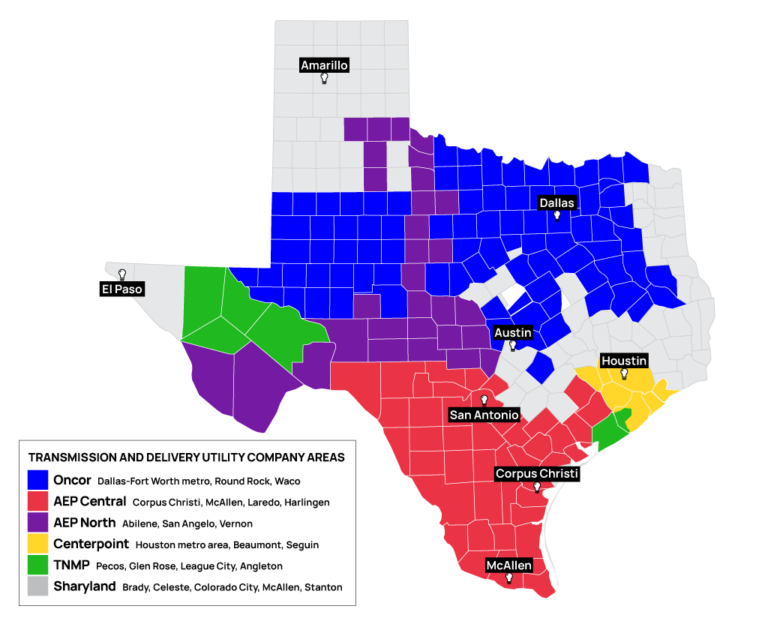How Commercial Electricity Rates Work in Texas
Get the best electricity rates with Texas electric companies verified by energy experts

How Electricity Rates Work in Texas
What goes into turning on the lights for your home or business? Something that may seem simple actually has many components and options. And, the way electricity prices are determined in Texas is different from California to Connecticut and everywhere in between.
Who’s who in the Texas energy market
To get power for your home or business, you will interact with a few different parties, depending on where you need service. If you live in a regulated part of the state, your one-stop shop is the Co-op or utility for your designated region. Regulated utility territories do not have the choice of electricity providers. Find out if you fall into this category by checking out the map below or by typing your ZIP code into the Get Rates section.
Texas deregulated electricity areas

In areas of the state and country that are deregulated, you have a choice of retail electricity providers. That’s where we can help! If you can identify your utility (based on your Zip code), we can connect you with the suppliers who serve that area.
The difference between a Utility and a Supplier
The deregulated utilities in Texas are Oncor (North Texas), Centerpoint (Houston area), TNMP (North and West Texas) and AEP (Central and South Texas). These “poles and wires” electric companies deliver electricity to your home or business. They are also the ones you call for power outages, construction for new power lines or summaries of your historical electricity usage. There are transmission and distribution costs to maintain the power grid’s infrastructure and those rates are regulated by the public utilities commission (PUC) through different utility tariffs. For residential customers, the utility rates are often lumped into the overall supply rate provided by the retail electricity provider, which is why residential rate plans appear more expensive than commercial.
Retail Electric Providers (REPs), also known as Suppliers, are companies who buy wholesale electricity and sell it to end-users. By competing in wholesale natural gas and power markets, suppliers have the incentive to keep energy rates low for their customers.
Considerations when choosing an energy plan
Partner with a credible Energy Provider
How can you tell which providers to trust with your energy supply? The good news is that 5 Digital Energy has already done that research for you! The suppliers you see represented on this website have been thoroughly vetted by our team. More often than not, the risk to a customer’s home or business is not just the average price of power, it’s the fine print of the supply agreements. After thousands of transactions, we are confident in the quality of electricity providers that we work with.
Avoid gimmicks
You have likely heard the ads on radio, television and all over social media: “Free nights and weekends!”, “$50 bill credit for usage over 2,000 kilowatt-hours”, “Free gift cards!”. The reality is that nothing is “Free”! The rates that these energy plans charge during the time-of-use are more than enough to cover any incentives that they provide the end user.
Energy Facts Labels (EFLs) are required for residential electricity plans and are meant to standardize all rates so you can compare them on an even playing field. The EFL has to make assumptions on your kilowatt-hour usage to standardize that offer. If the plan is fully fixed with no additional charges passed through to the customer, the EFL will show the same rates as the offer, regardless of usage.
Lowest electricity rate does not always equal the lowest electricity bill.
Be wary of energy plans that are dramatically less expensive than other supplier offers. Electricity is a commodity and all suppliers have to make purchases from the same wholesale market, we would expect all offers to be very similar. If you see a rate that is significantly cheaper, that supplier may be passing through certain components to you. For example, adding a customer charge or not including hub to load-zone congestion costs.
How do you know what to do? Don’t worry, we’ve got you covered. All of the commercial electricity plans you see on this site are fully fixed and do not have additional hidden fees. You can feel confident knowing that you are comparing apples to apples! This is also why you won’t always find an EFL associated with a commercial contract. Since they are all fully fixed, there is no standardization needed.
Beware of Early termination fees
For the past few years in the Texas electricity market, energy prices have been less expensive in the future years than in the present. This market phenomenon is called backwardation and is why you’ll often see longer term agreements with lower rates than shorter term electricity plans. Choosing the lowest rate on the website is likely to be found in a contract that is 4 or 5 years long. For some homes and businesses, that’s great! Not having to worry about your electricity for several years is a bonus to locking in lower rates. For others, there are additional fees if it is necessary to get out of that contract before the term expires.
The most popular question we get from customers is “What is my early termination fee?”. Unfortunately, this is not an easy question to answer. Where many residential plans have a flat fee to cancel the agreement, commercial plans are often more complex. When you enter into a supply agreement, the energy provider hedges electricity from the power market to sell back to you over the duration of the agreement at the energy rate you agreed to in the contract. Based on the amount of electricity you use, the supplier is able to estimate how much they will earn over that term length. If you cancel the agreement early, they will use the time left in the contract as well as the market electricity price to assess their financial damages. In other words, the more time you have left on the contract, the higher your early termination fee will likely be.
We usually do not recommend breaking your agreement early. However, sometimes it is unavoidable and there can be other options:
- If you are moving, ask your supplier to do a site substitution. Assuming that the business location is in the same general area of the utility and will use approximately the same amount of kilowatt-hours, suppliers can swap your new meter in for your old one and you can keep the same contract.
- Assign the agreement to the new tenant. Some suppliers will allow you to transfer your contract to the next owner of the facility. If the early termination penalty is too high, you can include the energy plan as part of the sale of the building.
- Choose a supplier with flexible terms and conditions. Engie and APG&E both have commercial contract language that allows termination of your electricity agreement without penalty in the event of a sale of the business or if you go out of business provided you give 30 days’ notice. This is not a get-out-of-jail-free-card, but if you have proof from the Secretary of State, it could save you a nice chunk of change.
Steps to getting power for your business
If you’re looking to get the lights turned on at your business or move power from a landlord’s name into yours, there are a few things you’ll need to complete:
- Make sure you have an ESID (Electric Service Identifier). In Texas, there is an ESID for every meter associated with a service address. If you are doing new construction, contact your utility to get an ESID created. If you are moving to an existing space, you’ll need to know your service address. You can verify your ESID number with our look-up tool.
- Get all necessary inspections. Contact your municipality to see what inspections and/or certificates of occupancy are needed. You can find the phone number of your inspections department here. Each city has its own rules and regulations and when they have everything in order for your business, they will tell the Utility that you are good to go.
- Choose a Retail Electric Provider (REP). That’s where we come in! Find energy plans on this site or call and we will help you enter into a supply agreement. Once the contract is booked in the supplier’s system, they will submit a “Move In” order to the Utility.
Lights still not on? For questions about the status of your order, call your utility to see what they’re waiting on. More often than not, there is a hold from the city because all of the inspections are not in order.
We are with you every step of the way! Contact us now if you have questions about anything energy related. An entire team of energy experts people who know the Texas Energy Market inside and out is on the other end of the phone and computer screen. We are here to help you navigate this important expense for your home and business!
